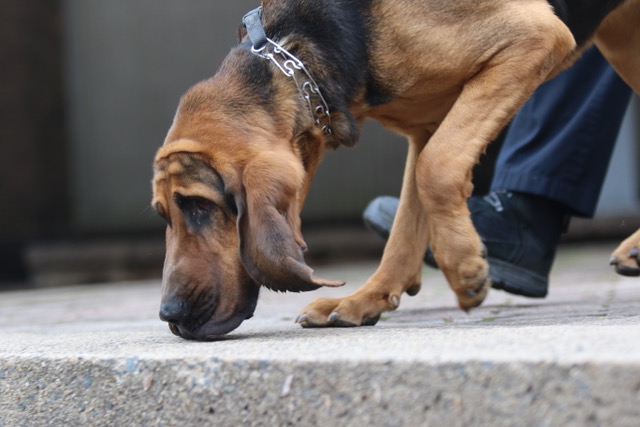In the Mercer County Sheriff’s Office, one of the most important crime-fighting tools authorities have might be the nose of a 3-year-old Bloodhound named Flash.
Flash is one of eight dogs used to battle crime and protect the lives of the people who live, work and travel through the area — the four-legged partners of a close-knit group of seven sheriff’s officers who serve as their handlers. Their work is deadly serious.
Calls can come from anywhere, inside or outside the county, and involve real-time situations that run the gamut from searching for a missing child to investigating a piece of unattended luggage at Trenton-Mercer Airport in Ewing Township.
“It’s a lot,” said Officer Pat Papero, after joining other officers for a demonstration for students at Mercer County Community College, West Windsor, on Oct. 29.
Papero has been a dog handler for about nine years, now working with a bomb dog, a German Shepherd named Baron. On any given day, Papero and Baron could be walking together at the airport into a situation where the dog’s keen sense of smell is critical, to safeguard the lives of the people they are there to protect.
“Our saying is ‘Trust your Dog,’ ” Papero said. “We train the dog, we train them on all the substances, we train them in different environments.”
Officer Mike Restuccia is the handler for Flash, whose long ears drag along as his nose seems to be constantly sniffing. Flash came to the department as a donation from a Pennsylvania family who felt he was too much of an active dog for a couple that had twin boys.
Restuccia said he visited Flash “and the rest is history.”
“We fell in love from there,” he said, getting a laugh from the students.
The two of them went through 12 weeks of training together. As the college students stood watching, he explained he will present the dog a scent order and command him to “track.”
“He’s keeping his nose to the ground following the scent of the dead skin cells someone is shedding as they are walking away,” Restuccia said. “They are very active dogs. They thrive on work.”
The sheriff’s office has had a K-9 unit since 1993, when there were two dogs in the department. As with any human personnel, dogs come with costs, including medical and food expenses. But Mercer County Sheriff Jack Kemler sees the value in having them around.
“Having served in the K-9 division of the Trenton Police Department early in my career, I support the significant role K-9 units can play in demanding and extraordinary law enforcement situations,” Kemler said in a statement.
For the handlers, membership in the unit is voluntary.
“If you don’t like dogs, you’re not going to go into this,” Papero said. “You’re being taught a skill that about 1 percent of police officers in the country get to do.”
The three dog breeds the sheriff’s office uses are German Shepherd, Bloodhound and Belgian Malinois. The dogs and their handlers are trained together at a facility run by the New Jersey State Police, 18 weeks for a patrol dog and 14 weeks for a bomb dog.
“The dog doesn’t know he’s looking for a bomb, the dog doesn’t know he’s looking for a drug or a missing person, the dog thinks he’s finding that towel,” Papero said. “When we train the dogs, what we do is we put whatever we’re looking for in that towel.
“We’ll tease the dog with the towel and then we throw the towel either into high weeds, into grass, where they can’t see it. We’ll hide it from them in a building and then we teach them to find it. If they knew they were going in for a bomb, they probably wouldn’t go. We’re the dumb ones who know we’re going in,” Papero said.
Most of the police departments in Mercer County have a K-9 unit. Last year, the Mercer County Prosecutor’s Office unveiled a new training facility, in Ewing, for K-9 units.
The sheriff’s office will respond to calls in and out of the county. For instance, the office worked Super Bowl XLVIII between the Denver Broncos and the Seattle Seahawks in 2014, when the game was played at MetLife Stadium. Other assignments have included the Miss America Parade on the boardwalk in Atlantic City and to protect dignitaries who visit the area.
For handlers like Steve Caruso, there is a trust factor that goes along with working with a dog.
“You can’t go out there and not believe your dog is not going to work,” he said. “We do this, we train. You’re ready for that situation and you trust him 100 percent. Never failed me yet.”

